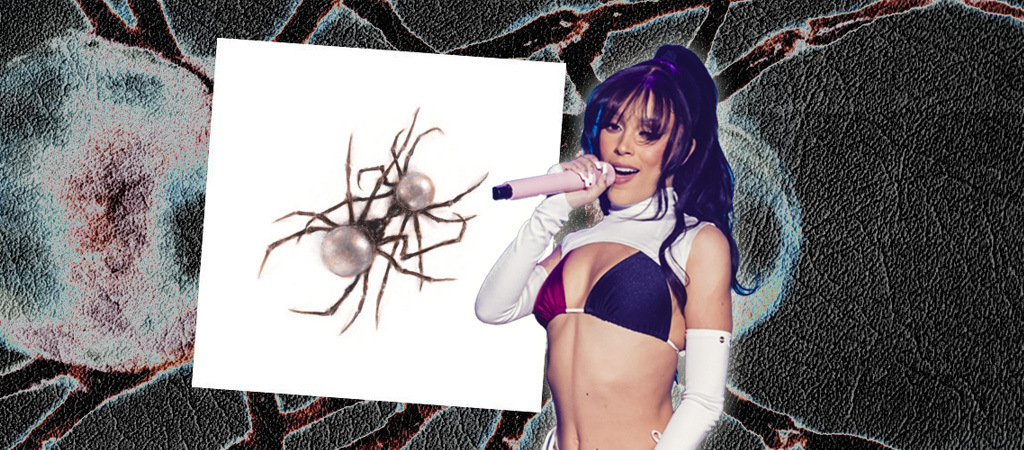On Scarlet, her fourth and latest full-length album, Doja Cat sounds both supremely self assured and extremely hacked off at the same damn time. Both states appear to be the result of the last two years worth of accolades and accomplishments and an overwhelming deluge of debates about whether any of it was deserved.
Let’s get one thing out of the way right here and now; absolutely, every damn bit of it was deserved and earned by Doja, by virtue of both her talent and her hard work. But so much success these days comes with caveats; if you’re the best pop star of the nascent 2020s, you simply CAN’T be a rapper. Pretty privilege plays a part, of course. Then there is that forever looming shadow of sexism, the one that says the men in the audience are owed ownership of your sexuality (even though you never made the art for them in the first place).
Doja Cat has spent the last year systematically dismantling every one of these arguments and the majority of Scarlet is directed toward that end, as well.
I already wrote about how Doja has always been a stylistic chameleon, but since then, the wildly eclectic star has revealed more of just how trying the last few years of judgment and scrutiny have been. She has railed against so-called “stan culture,” in which obsessive followers of various pop stars wage never ending and increasingly nasty wars of words on social media on behalf of performers who rarely ask them to.
On Scarlet, she hammers home the point that this is not normal. The parasocial relationship that exists between artists and their listeners has always had ominous implications but they’ve always been sublimated, hazy, just out of sight. On social media, they’ve become unavoidable, and Doja Cat is fed up. She repeatedly lashes out at the speculators and skeptics, offering them several seats to watch the show while simultaneously shushing both their toxic banter and overfamiliarity. “Stop-callin’-me-sis body bitch, we not a kin,” she snarls on “Shutcho.” “You do not exist to me, miss, I’m not your friend.”
Meanwhile, Doja also pushed back at her own public image during this album’s rollout. While the pristine presentation is polished pop perfection has served her well in climbing her way to a successful career, she’s vented many times that it hasn’t been creatively fulfilling. I keep coming back to this point again and again in writing about this artist, but Doja is at heart a backpack rap kid. She was raised by musical influences like Little Brother and Erykah Badu. And while even the staunchest of underground rappers had been unafraid to sonically experiment, for Doja, churning out disco-pop confections like “Kiss Me More” and “Say So” must have eventually worn like an itchy Christmas sweater in early autumn.
Doja wears her influences on her sleeve here; “Often” sounds straight-up like old-school Baduizm. She tried this sort of hazy, incense-tinged thing before,way back when on 2012’s “So High,” but where she didn’t quite have the poise to make it stick then, she sounds much more natural and comfortable here. Meanwhile, songs like “Paint The Town Red” and “97” track like brighter, more futuristic versions of the murky underground rap Doja was surrounded by in the orbit of early aughts Project Blowed spin-offs created by veterans of the renowned open mic.
Scarlet is clearly the album that the snarky battle rapper inside her has wanted to make since the beginning. Her pen game has always been ferocious but here, she elevates barbed wit with specific targets in mind. On the dramatically titled “Balut,” she sneers, “You are fleeting, so you can’t copy this” – a subtle jab at haters recalling the short-lived and ill-advised Twitter feature that sought to force a Xeroxed version of competitors’ products onto its own reticent user base.
Certainly, she’s had enough speculation from concern trolls in her Instagram comments calling her tattoos demonic and theorizing about things she considers nobody’s business but her own. “Skull And Bones” addresses the rumormongers directly; “Y’all been pushin’ ‘Satan this’ and ‘Satan that,’” she mocks. “My fans is yellin’, ‘Least she rich,’ you need that pact / Lookin’ like I got some things you hate I have / And trust me, baby, God don’t play with hate like that.”
On “Agora Hills,” Doja offers her own theory about the scandals and backlashes that have followed her since she blew up – and those who start the drama. “Boys be mad that I don’t fuck incels,” she muses. “Girls hate too, gun to their pigtail.” In Doja’s mind, it’s all the same thing: Social pressure to conform directed at someone who’s accomplished so much because she refuses to do so. “Agora Hills” also best encapsulates where Doja is on Scarlet – it’s a love song to her man, it’s a withering diss to her haters, it’s a trolling response to critics of her identity (including herself; her white girl voice on verse one is a thing of comedic beauty).
Doja said during the rollout of the album that it was written over the course of two very different periods in her life. That’s evident in the latter half of the album, when it sounds like Doja is very much in her soft girl era. But Scarlet itself is a rejoinder to the idea that artists must be only one or two things or that their entire existences belong to the fans. They often say “I wouldn’t be here without you,” and to a certain extent, that’s true. But they also wouldn’t be where they are without the quirks and individuality that make them who they are, that draw us to them. They own that part themselves and owe it to absolutely no one else. Scarlet’s as much a reminder of that to Doja Cat as it is to us.
Scarlet is out now Kemosabe and RCA Records.







